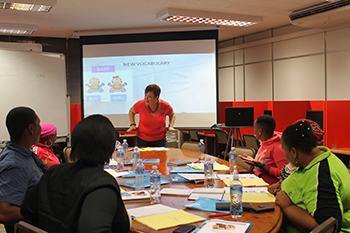Latest News Archive
Please select Category, Year, and then Month to display items
02 January 2025
|
Story Gerda-Marie van Rooyen
|
Photo Supplied
 Leading the research in South Africa is Prof Linus Franke from the Department of Soil, Crop and Climate Sciences.
Leading the research in South Africa is Prof Linus Franke from the Department of Soil, Crop and Climate Sciences.
Scientists are actively pursuing the successful breeding of diploid hybrid potatoes from inbred lines. This is expected to revolutionise potato breeding as it holds the key to rapid genetic progress. It will introduce new varieties for commercialisation through seed. Currently, existing potato variants have a gene that renders self-pollinated seeds infertile.
Prof Linus Franke, an academic in the Department of Soil, Crop and Climate Sciences at the UFS, is leading the research in South Africa. “This technology allows the production of genetically uniform potato seed that is easy to transport and largely disease-free.” He says this differs from conventional breeding whereby only vegetative propagation is possible due to tetraploid varieties in potatoes. It also risks carrying pests and diseases from one generation to the next – leading to the accumulation of pests and diseases with each round of multiplication.
Seed innovation
Prof Franke explains that Solynta BV, a seed company based in the Netherlands that produces potato varieties that can be grown from seed, has included South Africa in their research efforts because it is one of Africa’s largest producers and exporters. Through his academic relationship with Wageningen University and Research, a Dutch institution renowned for its agricultural endeavours and food production, the UFS became involved in researching hybrid potatoes grown from seed.
Diploid seeds containing two sets of chromosomes allow easier gene manipulation to increase predictability and speedier genetic progress. The breeding approach enables the incorporation of tolerance to pests, diseases, abiotic stresses (cold, heat, drought) and other desired genetic traits.
Although Prof Franke is optimistic about this research, he is not blind to disadvantages. “Potato seeds are tiny and have little energy reserves, making it harder to grow potatoes from seed than from tubers.” He says potatoes from seed will take longer to cultivate than tubers, as farmers need to grow plantlets from seeds first, adding six weeks to the growing period. “It is possible that commercial farmers can grow potatoes directly from seed. Alternatively, perhaps more likely, specialised growers will produce tubers of potatoes from seed; these tubers are then sold as seed tubers to other potato farmers, who then continue their normal practices of producing potatoes for the market from tubers.”
Financial benefits
Prof Franke says farmers have reason to get excited. “Seed potatoes will reduce input costs, as varieties with enhanced tolerance to pests and diseases require less pesticides. Planting one hectare of potatoes requires three to four tonnes of potato tubers, but only one 25 g packet of potato seeds.” Since potatoes are a more valuable commodity than maize, this technology might also increase farmers’ income potential.
UFS provides sign language skills to locals
2016-02-12

Susan Lombaard teaching at one of the sessions
Photo: Valentino Ndaba |
The public and private sectors are becoming more aware of the need for effective communication between employers, employees, and clients who use Sign Language. Given that Sign Language is the first language of approximately 600 000 people in South Africa, competence in the language means taking the first step towards more inclusive service delivery.
Shout Out Loud - a project that promotes Sign Language - has signed up Bloemfontein Celtics, Centlec, Beyond Boundaries, and the Mangaung Municipality on a Basic South African Sign Language course at the University of the Free State.
No miscommunication
Susan Lombaard, the Acting Head at the Department of South African Sign Language, was one of the lecturers who presented the 40-hour accredited course every Friday from 15 January-12 February 2016. Other lecturers who were responsible for training were Emily Matabane and Tshisikhawe Dzhivani.
Lombaard believes that learning Sign Language bridges the gap between the hearing and those who have impairments. “The benefit is that there will be no miscommunication. It happens that a deaf person walks into a bank or municipality offices and there is no communication. They need to write which is humiliating for that person.”
Towards a promising future
According to Goodwill Mokoena, Project Manager at Beyond Boundaries, the project will continue annually, and a larger intake of government departments and non-governmental organisations is expected in 2016.He also indicated that Shout Out Loud has achieved substantial success in its involvement with the Bartimea School for the Blind and Deaf.
Shout Out Loud selects one pupil every month, and flies them to Johannesburg to interpret on Bloemfontein Celtics’ magazine show. It is the only magazine show in South Africa that has a sign language interpreter. “The school has been achieving 100% in matric results because the pupils are selected on merit. This has enhanced their academic performance in such a marvelous way,” said Mokoena.